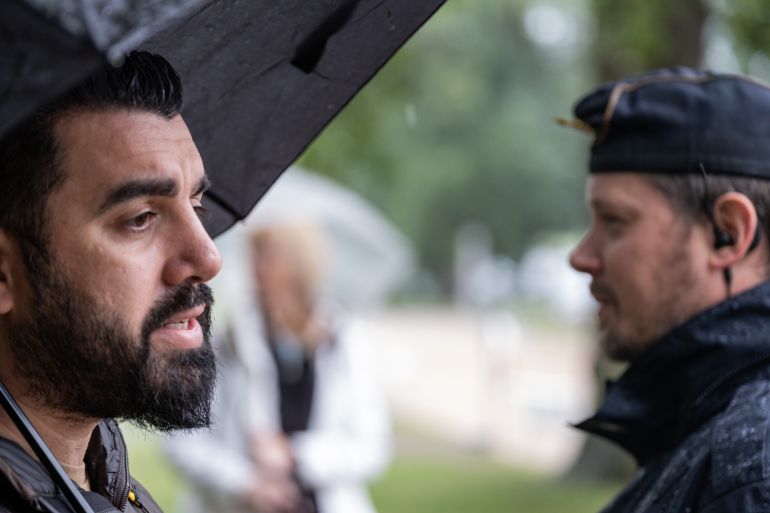Chocolates and a Chat: A Peaceful Response to Quran Burnings in Sweden
EUROPE, 14 Aug 2023
Nils Adler | Al Jazeera - TRANSCEND Media Service
Muslims present at the burnings refuse to be provoked as they hand out chocolates and seek dialogue with onlookers.
8 Aug 2023 – On a rain-trodden sandy beach in an affluent, suburban area of Sweden’s capital, Husam El Gomati, a sociable entrepreneur originally from Libya, gently placed his hand on the arm of an exasperated, physically imposing young man.
“You’re right, you’re right,” El Gomati said in a soothing voice as the man shouted at a woman from behind a line of stone-faced Swedish police officers, pleading with her not to burn a copy of the Quran.
The woman, an Iranian refugee with a bright red Coca-Cola-branded baseball cap, was holding the holy book above a series of burning wooden logs.
She laughed dismissively at the man as she tore pages from the Quran and scribbled haphazardly over it with a ballpoint pen.

The man, who said he was of Kurdish origin, gesticulated angrily as he told the woman the police shouldn’t be forced to stand in the rain protecting her. They should, instead, be out doing their job – stopping crime, he said.
He accidentally knocked his transparent umbrella into a police officer spraying water over their rain-sodden headgear and immediately apologised.
“Please forgive me,” he told the officer, who acknowledged the comment with a firm nod of the head.
El Gomati spoke to the concerned man softly in Arabic, and after he was assured that the situation wouldn’t escalate further, he walked away.
That was exactly why El Gomati decided to come – to ensure that any member of the Muslim community, in the face of provocation, did not feed elements of society that would be looking for any material that could play into what he describes as Islamophobic narratives.

Chocolates and dialogue
Over the past few months, in the face of numerous Quran burnings, El Gomati and several other members of the Muslim community have taken it upon themselves to shift the lens from the agitators seeking to garner attention by burning the Quran and to instead focus on engaging in friendly dialogue with the media, bystanders and the police.
Several Quran burnings, permitted under freedom of speech laws in Sweden, have taken place in the Nordic nation in 2023, prompting outrage in Muslim countries that have demanded the government put a stop to the incidents.

In late June, at a burning intended to shock and antagonise the Muslim community in front of a Stockholm mosque during the Eid al-Adha holiday, El Gomati could be seen weaving through the crowd with a few friends handing out expensive chocolates.
Laughing and joking with onlookers, they entirely ignored the near-constant barrage of provocative rhetoric being broadcasted by Salwan Momika, an Iraqi refugee seeking to ban the Quran, on a megaphone.
![A man criticises a person's decision to burn the Quran on a Stockholm beach. August 3, 2023 [Nils Adler/Al Jazeera]](https://www.aljazeera.com/wp-content/uploads/2023/08/DSCF8705-1691403074.jpg?w=770&resize=770%2C513&quality=80)
“It’s very hard to refuse a chocolate”, El Gomati quipped, adding that it allows them to engage in a “friendly dialogue” with people.
“It’s calming a few angry people because I showed them another response … by being extra nice … and it’s I think it’s a much stronger and more effective than showing hate or showing aggressiveness”.
Don’t give the far right what they want
El Gomati admits there is nothing enjoyable about traipsing around Stockholm on his days off to witness another burning of the Quran.
“I’m not too happy about it, to wake up in my holiday to go and try to calm people down,” he said. But he added that it is essential, as some people, particularly on the far right, would love to see a violent response.

Julia Agha, the head of Alkompis, an Arabic-language news channel in Sweden that has had reporters present at every burning, says that most Muslim people in Sweden feel “hurt and unfairly treated” by the burnings rather than the stereotype often projected in social media, which portrays them as more violent.
The atmosphere, she said, has often been calm.
Some who turn up are saddened by the proceedings, while others shout out emotional responses.
The subdued reality of the proceedings rarely correlates with the inflated and more aggressive image projected on social media, she said.
Pressure on the Swedish Muslim community
Sweden’s Muslim minority faces enormous pressures from several different directions, El Gomati said.
Elements of the political system are pushing Islamaphobia, and pockets of the Swedish media have produced an “extremely negative” stereotype of Muslims.
He also finds himself explaining why the Quran is so important for Muslims to baffled Swedes, who are used to living in one of the most secular societies. Some of them fail to grasp the weight with which any religious community feels the act of burning a holy book.
If you look at other countries in Europe or the Middle East, or at the United States, he said, there is a level of understanding around the relationship between an individual and their holy book that “the typical Swede cannot understand”.
However, the pressure on the Swedish Muslim community is not just from Swedes who expect them to “accept” and “be happy” about the secular nature of the society, but also from Muslims abroad.

Many of his friends outside of Sweden expect more action, he said.
“[They ask me], ‘How can you accept this as a Muslim? You need to do something about it. It doesn’t matter what’.”
He favours a solution that centres on using the existing legal system in Sweden to change the regulation allowing such acts to take place, rather than trying to force a political decision based on highly charged protests – a tactic that is less likely to work in a country like Sweden.
He has reported several incidents that he classifies as hate speech and that have occurred at the burnings to the police.
Many Swedes fear that the Muslim community is looking to change Swedish society by banning the burning of the Quran.
But according to El Gomati, “We just want our space, and we want our values to be respected like we respect other values, and we respect other groups of people here in this society.”
________________________________________________
 Nils Adler is a British journalist currently based in Stockholm, Sweden.
Nils Adler is a British journalist currently based in Stockholm, Sweden.
Go to Original – aljazeera.com
Tags: Agent Provocateur, Europe, Muslims, Quran, Religion, Religious Freedom, Sweden
DISCLAIMER: The statements, views and opinions expressed in pieces republished here are solely those of the authors and do not necessarily represent those of TMS. In accordance with title 17 U.S.C. section 107, this material is distributed without profit to those who have expressed a prior interest in receiving the included information for research and educational purposes. TMS has no affiliation whatsoever with the originator of this article nor is TMS endorsed or sponsored by the originator. “GO TO ORIGINAL” links are provided as a convenience to our readers and allow for verification of authenticity. However, as originating pages are often updated by their originating host sites, the versions posted may not match the versions our readers view when clicking the “GO TO ORIGINAL” links. This site contains copyrighted material the use of which has not always been specifically authorized by the copyright owner. We are making such material available in our efforts to advance understanding of environmental, political, human rights, economic, democracy, scientific, and social justice issues, etc. We believe this constitutes a ‘fair use’ of any such copyrighted material as provided for in section 107 of the US Copyright Law. In accordance with Title 17 U.S.C. Section 107, the material on this site is distributed without profit to those who have expressed a prior interest in receiving the included information for research and educational purposes. For more information go to: http://www.law.cornell.edu/uscode/17/107.shtml. If you wish to use copyrighted material from this site for purposes of your own that go beyond ‘fair use’, you must obtain permission from the copyright owner.